Lyubov Talimonova
The Lullaby Tales
Translated from the Russian original by David Parfitt
© L. Talimonova, text, illustrations, design
All rights reserved. No part of this publication may be reproduced, stored in a retrieval system, or transmitted, in any form or by any means, electronic, mechanical, photocopying, recording or otherwise, without the prior permission of the publisher.
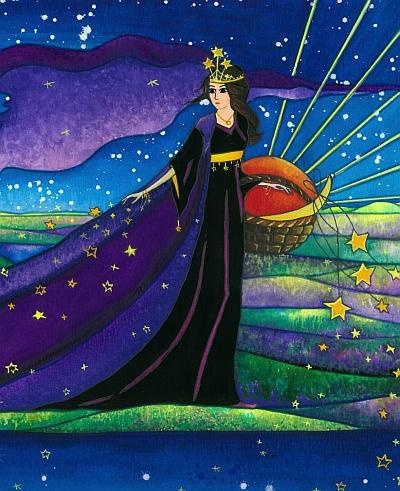
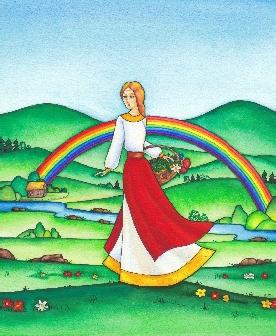
All rights reserved. No part of this publication may be reproduced, stored in a retrieval system, or transmitted, in any form or by any means, electronic, mechanical, photocopying, recording or otherwise, without the prior permission of the publisher.


Uncle Moon
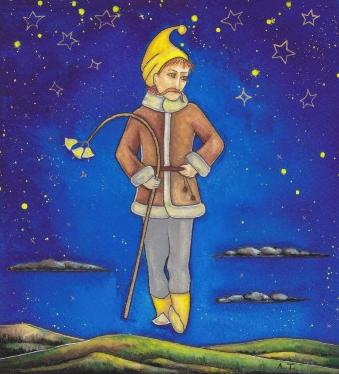
Night came and threw her shawl across the sky, and so the world became dark. The stars came out of their little houses and settled across the whole sky. Some stars gathered themselves into constellations while others scattered like diamonds across the Night’s shawl. Big stars and little stars played in the sky, drank tea together and chatted.
And then Uncle Moon rose from behind the mountains and began to make his rounds, making sure that everything was peaceful and quiet in the heavenly kingdom. As Uncle Moon walked, leaning on his staff, the little bells on it rang out: ding-ding, ding-ding. After the Moon had finished his walk he became very tired, so he climbed into the middle of the sky and sat down to rest. Laying his staff down beside him, he twirled his moustache, gazed round at the world and began to sing a song to himself.
The big stars and the little stars stretched themselves towards Uncle Moon, gathered around him in the middle of the sky and began to sing happy songs. And so the bright stars sang with the Moon till morning when Dawn came. And then Dawn cast the Night’s shawl down onto the Earth and began to shine across the whole sky.
The Beautiful Valley
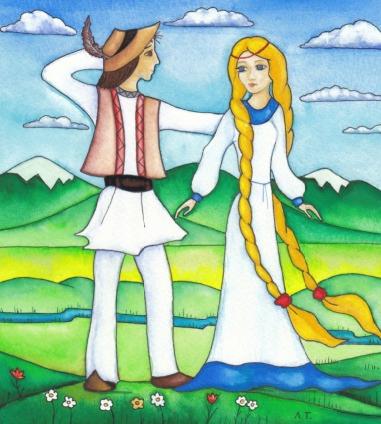
Once upon a time there was a Beautiful Valley. She was surrounded by mountains on all sides. If the biting cold Wind blew from the north then the mountains protected the Valley from his cold touch. If the hot dusty Wind rose up in the east, the forests that grew on the mountainsides cooled the East Wind down and brought him to rest on the warm slopes. The stubborn West Wind tried again and again to break through to the Valley, but each time the powerful mountains with their solid, immovable peaks stood in his path. And as the West Wind battled with the mountains he lost his strength and poured rain over the rocky cliffs and ravines.
But there was also another wind – neither hot nor cold, neither strong nor stubborn, but warm, fresh and pleasant. This was the South Wind that came in Spring. He never quarrelled with the mountains, and when he wanted to see the Beautiful Valley he simply blew in, knocked on the gates and the mountains opened up and made way for him. The South Wind courteously nodded his head towards the old mountains and rushed between them to meet the Beautiful Valley. Then he sat down right at her feet, took out a little flute from his pocket and began to play wonderful sweet melodies that he had picked up from all over the world.
The whole Valley simply blossomed at the sound of such beautiful music. Her eyes became even brighter, a rosy flush spread across her cheeks, and the rivers formed by the plaits of her hair flowed even faster. When the melodies stopped, the mountains picked up the echo of the music and held it in the air so that the music rang out even longer in the sky.
Then the South Wind rose up, took off his little hat and with a bow he invited the Beautiful Valley to dance. The Beautiful Valley never refused him a dance because she loved the kind, gentle Wind. While the Valley and the Wind danced, everything around became happy along with them and the flowers and trees burst into blossom.
When evening came the South Wind said goodbye to the Valley. He took off his little hat and bowed once more, and the Beautiful Valley lowered her eyes, blushed in the rays of the setting sun, and with a sigh waved her handkerchief after the departing Wind. The kind old mountains also sighed softly and whispered to one another: “So when will the wedding be?”
The Mist
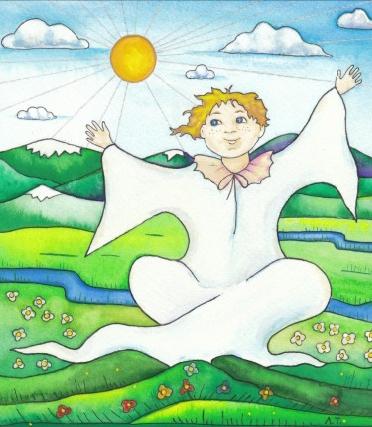
Night left the Earth and went to wake the Morning. The fresh, bright Morning stirred and smiled at the Sun, and then he took a basket of little dew-drops and went to wake the New Day and everything else in the world.
And at the bottom of a deep valley the Mist slept, rolled up tight into a ball above a marsh. When Morning passed by he lit up the edges of the valley. The Mist opened his eyes and sighed, before falling sound asleep again.
And when the New Day came into the world, he peeped with his sunny eye into the very bottom of the valley where the Mist was sleeping. The Mist opened his eyes again, sat up with a yawn and stretched, before spreading himself out across the whole valley.
The Day
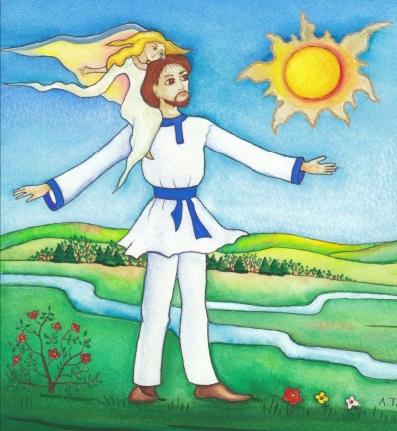
The Sun rose and began to play a cheerful Melody on his rays of sunlight, plucking them like strings. The Melody echoed between the Earth and the heavens, then flew across the meadows, forests and fields. Eventually she reached the Clear Day, who was sleeping in a warm little valley, and gently tugged at his moustache. The Day woke up and the first thing he did was to smile at the whole world. Then he sat down, rubbed his eyes and saw the Melody, who had become entangled in a nearby bush. The Clear Day carefully disentangled the twigs and leaves from the Melody’s clothes, sat her on his shoulder and rose up above the Earth to his full height. The Day sighed deeply and slowly stretched his arms, as if embracing the whole world. This made everything around him happy and it all began to shine: the sky brightened, the dew-drops on the grass glittered and the gently flowing river sparkled.
Before the Sun set off on his daily journey across the Earth, he gave the Clear Day his harp. As the Melody whispered notes and music into his ear, the Day plucked the strings. Everything around them came to life and began to be heard: the grass rustled, the forests stirred, the streams gurgled, the birds sang, the bees buzzed and the air was filled with the sweet smell of a summer’s day.
By this time the Sun had reached the highest point in the sky and from there he waved his hand at the Day. The Clear Day placed the harp on the ground, sat the Melody behind it and danced in a circle ever faster and faster! The grass, trees and streams stood still, the birds and bees fell silent, the wind died down and even the clouds moved towards the horizon to watch the Day dance. Everything grew quiet and still, and only the sounds of hot Day’s dance could be heard.
When the Clear Day finished the fast dance he was very tired and sat down in the shadow of an old oak to catch his breath. The Melody had also become tired of playing the harp and so she sat down nearby and sighed.
It was cool and pleasant in the shade, and the gentle rustling of the oak’s green leaves made them feel sleepy. The Melody soon dozed off without realising it, and the Day’s eyes also began to close of their own accord. And then suddenly a lark with a clear, ringing voice flitted out from the grass straight up into the sky and began to sing a song. The Clear Day woke with a start and thought: “Why am I dozing in the middle of such a beautiful day? That’s not right!” He woke up the Melody, sat her on his shoulder once more, took the Sun’s harp and set off after the Sun to watch him light up the world.
The kind Day followed the Sun to make sure there was enough warmth and happiness for everyone in the world. If the Day saw a bird that looked sad, he took it in his hands and sang or whistled a cheerful song for it. If some flowers were drooping, he bent down and carefully lifted their heads to the sky and the warm Sun. If the weeping willows were still weeping with morning dew, the Day wiped and dried their tears. When angry storm clouds drifted across the sky, the Clear Day led them in a dance so that they turned into happy white clouds and sailed on their way.
And so the Day crossed the Earth – dancing, playing, singing songs, making others happy and comforting them. But all of a sudden he stopped with surprise, as there in front of him was the little valley where he had spent the previous night. The kind Day placed the harp on a passing cloud, sat the sleeping Melody on another cloud, and sent them both home to meet the Sun. The Day gently sighed, lay down on the grass in the warm valley and fell sound asleep.
The Shadow
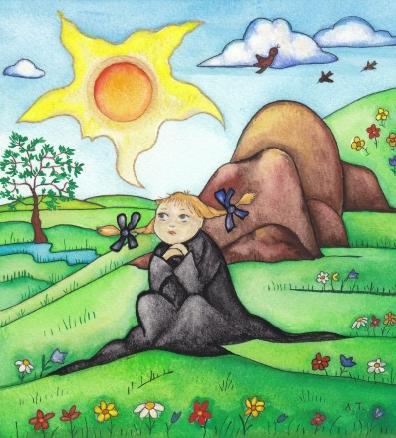
The Sun rose and lit up the whole world with his rays. Everything on Earth was tinted with his bright colours: things that were dark and black at night became yellow, green, blue, red, white and brown. Everything in the world began to shine and grow warm, even the bleak and barren mountains.
On a small hill there lived a stone. The stone was neither large nor small, but could be seen on the side of the hill. At night the stone was grey and by day it was dark brown.
Near this stone lived a Shadow. She was a very ordinary Shadow – grey during the day and totally invisible at night. And like every Shadow she was terribly shy: as soon as a cloud appeared in the sky that was slightly bigger than usual the Shadow froze with fear. She was very unhappy with being like this, and especially with her greyness. “The Sun makes everything bright, beautiful and happy. White clouds float across the blue sky while birds sing in the trees. The lake is also blue and golden fish play in it. Even on the brown stones there are lizards sitting and resting. It is only me that misses out on the Sun’s rays. When the Sun lights up the whole world I still remain grey and drab. The brighter the Sun the darker I become. So what use am I to anyone?” thought the unhappy Shadow.
And meanwhile the cheery Sun was directly overhead. The Shadow looked glumly at the Sun, grew even darker, and with a sigh took refuge under the stone. And there she sat for several hours in boredom. When the tired Sun finally began to dip towards the Earth, the Shadow peeped out from under her stone and began to gaze sadly at the world around her.
Then from somewhere a delicate little butterfly appeared. The wind had carried her from far away and so she had decided to settle down somewhere and rest. The butterfly landed on the stone and said unhappily: “Oh, how hot it is! It has scorched my little feet!” The butterfly flapped her multicoloured wings and settled lower down in the shade. Straightening her wings, she settled more comfortably and said: “Ah, how nice to rest in the cool shade after a long hot day!” At first the Shadow froze with amazement, but then she clasped her hands in delight and proudly stretched right out across the side of the hill.
Marina
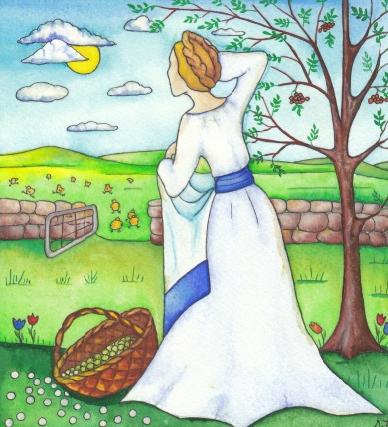
Once upon a time there lived a storm cloud, Marina, and her husband, Hurricane. They lived above the sea in a stone house with a stone wall around it. The house was neither big nor small, but it was warm and cosy with a large brightly-coloured stove inside. Marina cooked porridge and stew on the stove for her husband and the many relatives and friends who liked to visit them.
Marina and Hurricane also had a large farm with cows, horses, sheep and chickens – a whole herd of animals in the sky. Around the house there were fruit trees, a vegetable garden and a nice green lawn.
Beyond the stone wall were meadows, fields and endless pastures. Each morning, Hurricane drove his herd of animals out onto these pastures. The cows grazed slowly but surely and sailed across the sky as dark heavy storm clouds; the sheep spread out across the fields as white fluffy clouds; and the horses ran through the meadows and their hooves left little cloud trails in the sky.
One day, when summer was over and autumn had arrived, Marina took a small basket and headed into the vegetable garden to gather some peas. When the basket was full she set off back to the house, but on the way she noticed that her young grandson Breeze, who was staying with Marina and the Hurricane, had forgotten to close the gate. Because of this all the chickens had escaped from the yard. Marina gasped and dropped the basket on the ground. The peas scattered all across the garden in the sky and then fell to the Earth as hailstones. Marina put her hands on her head, looked at the fallen peas, and then picked up the empty basket to gather the escaped chickens. She ran out of the gate and saw that the chickens had scattered across a cornfield and were pecking at the fallen grain. Marina soon realised that she could not manage on her own, so she went to call her husband for help.
Конец бесплатного ознакомительного фрагмента
